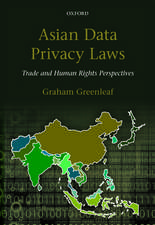Refining Privacy in Tort Law
Autor Patrick O'Callaghanen Limba Engleză Hardback – 14 sep 2012
| Toate formatele și edițiile | Preț | Express |
|---|---|---|
| Paperback (1) | 635.15 lei 6-8 săpt. | |
| Springer Berlin, Heidelberg – 15 oct 2014 | 635.15 lei 6-8 săpt. | |
| Hardback (1) | 638.43 lei 6-8 săpt. | |
| Springer Berlin, Heidelberg – 14 sep 2012 | 638.43 lei 6-8 săpt. |
Preț: 638.43 lei
Preț vechi: 751.10 lei
-15% Nou
Puncte Express: 958
Preț estimativ în valută:
122.20€ • 132.78$ • 102.72£
122.20€ • 132.78$ • 102.72£
Carte tipărită la comandă
Livrare economică 21 aprilie-05 mai
Preluare comenzi: 021 569.72.76
Specificații
ISBN-13: 9783642318832
ISBN-10: 3642318835
Pagini: 188
Ilustrații: XVIII, 170 p.
Dimensiuni: 155 x 235 x 16 mm
Greutate: 0.36 kg
Ediția:2013
Editura: Springer Berlin, Heidelberg
Colecția Springer
Locul publicării:Berlin, Heidelberg, Germany
ISBN-10: 3642318835
Pagini: 188
Ilustrații: XVIII, 170 p.
Dimensiuni: 155 x 235 x 16 mm
Greutate: 0.36 kg
Ediția:2013
Editura: Springer Berlin, Heidelberg
Colecția Springer
Locul publicării:Berlin, Heidelberg, Germany
Public țintă
ResearchCuprins
Refining Privacy.- Three Conjectures About Privacy.- A Privacy Curve.- Comparing Hard Cases.- Conclusions.
Textul de pe ultima copertă
This book is about privacy interests in English tort law. Despite the recent recognition of a misuse of private information tort, English law remains underdeveloped. The presence of gaps in the law can be explained, to some extent, by a failure on the part of courts and legal academics to reflect on the meaning of privacy. Through comparative, critical and historical analysis, this book seeks to refine our understanding of privacy by considering our shared experience of it. To this end, the book draws on the work of Norbert Elias and Karl Popper, among others, and compares the English law of privacy with the highly elaborate German law. In doing so, the book reaches the conclusion that an unfortunate consequence of the way English privacy law has developed is that it gives the impression that justice is only for the rich and famous. If English courts are to ensure equalitarian justice, the book argues that they must reflect on the value of privacy and explore the bounds of legal possibility.
Caracteristici
A new approach to privacy law drawing on interdisciplinary research Focuses on why privacy interests ought to be protected Explores the history of privacy law through use of a 'privacy curve' Considers how English privacy cases might be decided by German courts Includes supplementary material: sn.pub/extras

















